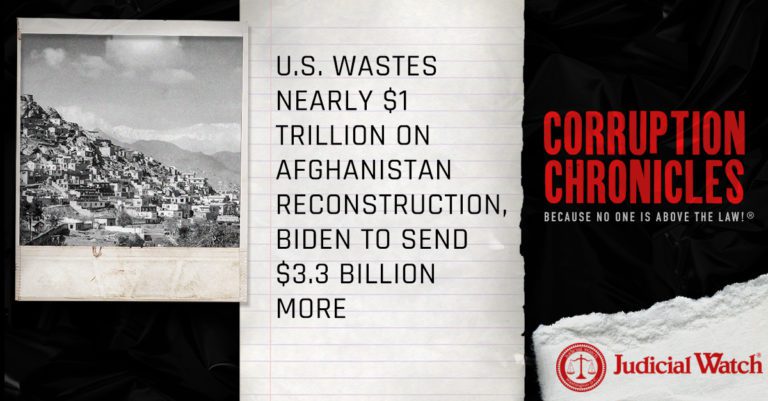
U.S. Wastes Nearly $1 Trillion on Afghanistan Reconstruction, Biden to Send $3.3 Billion More

In two decades of failed Afghanistan reconstruction efforts the U.S. government has spent almost a trillion dollars and President Joe Biden wants to dedicate billions more in the aftermath of his disastrous withdrawal from the terrorist nation. Judicial Watch has reported extensively on the pervasive waste, fraud and corruption that has long plagued the failed U.S. nation building project in Afghanistan which has seen an exorbitant flow of cash under both Democrat and Republican administrations. To compensate for the absence of American troops, Biden wants to throw in another $3.3 billion on the way out, a $300 million increase over last year, incorporated in the 2022 defense budget.
The U.S. has already wasted an eye-popping $837 billion fighting insurgencies in Afghanistan and $145 billion on building government and military organizations, according to the latest report issued by the Special Inspector General for Afghanistan Reconstructions (SIGAR). “The extraordinary costs were meant to serve a purpose — though the definition of that purpose evolved over time,” the report states. “At various points, the U.S. government hoped to eliminate al-Qaeda, decimate the Taliban movement that hosted it, deny all terrorist groups a safe haven in Afghanistan, build Afghan security forces so they could deny terrorists a safe haven in the future, and help the civilian government become legitimate and capable enough to win the trust of Afghans.” Clearly none of that was accomplished while “U.S. officials believed the solution to insecurity was pouring ever more resources into Afghan institutions,” the document further states. It discloses that 2,443 U.S. service members have been killed and 20,666 injured in Afghanistan.
The scathing 140-page report, the SIGAR’s last, trashes the U.S. by documenting its many losses in Afghanistan as the Taliban officially takes over the country’s government. Among the shortcomings is the U.S. government’s continuous struggle to develop and implement a coherent strategy, its unrealistic expectations involving the amount of time required to rebuild Afghanistan, unsustainable projects, counterproductive civilian and military policies, and the failure to properly monitor the impact of the costly efforts. “The U.S. government also clumsily forced Western technocratic models onto Afghan economic institutions; trained security forces in advanced weapon systems they could not understand, much less maintain; imposed formal rule of law on a country that addressed 80 to 90 percent of its disputes through informal means; and often struggled to understand or mitigate the cultural and social barriers to supporting women and girls,” the SIGAR writes.
For years the watchdog has exposed a multitude of wasteful transgressions in Afghanistan that should outrage every American taxpayer. Judicial Watch has reported on many of them, including the mysterious disappearance of nearly half a billion dollars in oil destined for the Afghan National Army, a $335 million Afghan power plant that is seldom used and an $18.5 million renovation for a prison that remains unfinished and unused years after the U.S.-funded work began. Among the more outrageous expenditures are U.S. Army contracts with dozens of companies tied to Al Qaeda and the Taliban. A $65 million initiative to help Afghan women escape repression was never monitored so the U.S. admits, because there’s no accountability, record-keeping or follow-up, it has no clue if the program was effective. A few years ago, Judicial Watch reported that a humiliating $8.5 billion counter narcotics effort in Afghanistan actually resulted in a huge increase in poppy cultivation and opium production. Today, Afghanistan is the world’s biggest supplier of illicit opiate.
Last year the SIGAR exposed that a snippet of the congressional budget to reconstruct Afghanistan, still a whopping $19 billion, was lost to fraud, waste, and abuse. In 90% of the cases examined by the watchdog, the money was blown “carelessly, extravagantly, or to no purpose,” according to a troubling report that hardly tells the whole story since it only considers a portion of the spending for that year. “Endemic corruption, widespread insecurity, and a lack of accountability over on-budget assistance continue to make any investments made in Afghanistan vulnerable to waste, fraud and abuse and may threaten the peace process as well as the perceived legitimacy and effectiveness of the Afghan government,” the SIGAR writes in that scandalous report. Reconstruction began in Afghanistan roughly a year after the U.S. invaded the Islamic nation to destroy Al-Qaeda and eradicate the Taliban. It has proven to be a huge debacle that continues fleecing American taxpayers.















